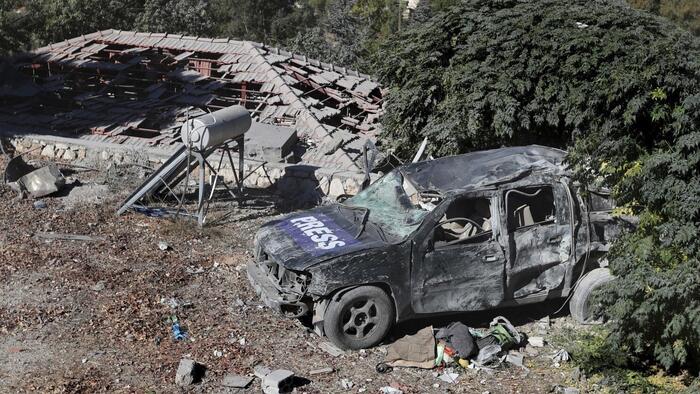On October 7, 2023, Lebanon accused Israel of committing a war crime following a deadly airstrike that targeted a guesthouse in Hasbaya, a region situated approximately 50 kilometers south of Beirut and close to the Syrian border. This attack, reportedly executed by Israeli warplanes, resulted in the deaths of three journalists associated with regional broadcasters Al-Manar TV and Al Mayadeen TV, prompting outrage from Lebanese officials. The victims, Ghassan Najjar, Mohammad Reda, and Wissam Qassem, were among a larger group of journalists who were present in the area to report on the ongoing conflict. This incident raises significant concerns regarding the safety of journalists operating in war zones and the implications of targeting media personnel in such settings.
The attack is said to have occurred at night, during which journalists had gathered for rest after a day of coverage. The hotel was known to house multiple reporters, with the presence of cars marked clearly as ‘press’. Lebanon’s Information Minister, Ziad Makary, condemned the airstrike as a deliberate act of assassination, asserting that it was premeditated and conducted with the intent of harming journalists. Makary’s statements indicated that this strike was not a random act but was carefully planned, given that numerous journalists were known to be present. Such accusations underscore the serious repercussions military actions have on press freedom and the protection of those in the field, particularly in volatile regions.
While Israel has not immediately responded to the incident, it might attempt to rationalize the airstrike due to the affiliations of the targeted broadcasters with Hezbollah and Iran—groups often viewed as adversaries by Israel. Journalists from other networks, such as MTV Lebanon, were reportedly on-site during the attack but managed to escape. These individuals relayed their experiences of the airstrike, painting an alarming picture of the chaos that ensued as buildings collapsed around them. The destruction of the guesthouse, particularly the total obliteration of the structure housing Al Mayadeen reporters, highlights the severe risk associated with journalistic work within conflict zones.
Notably, the airstrike on Hasbaya is part of a broader pattern of violence against journalists since the escalation of the Israel-Hamas conflict. Thousands of casualties have been reported, predominantly from Gaza, with many journalists facing attacks directly related to their coverage of the fighting. Israel’s documented crackdown on media outlets, especially those like Al Jazeera, which have been expelled from operating in Israel and the West Bank, raises profound questions about press freedom in conflict situations. The targeting of media personnel has dire implications not only for those directly involved but also for the public’s right to information during armed conflicts.
This tragic event has sparked widespread discussions about the ethics of warfare and the protection of journalists in conflict zones. As highlighted by Youmna Fawwaz, a reporter from MTV Lebanon who witnessed the attack, the absence of any warning before the strike indicates a worrying disregard for the safety of the press. Journalists rely on protection from international laws designed to safeguard them during combat, yet incidents like this call into question how effectively these measures can be enforced. The situation illuminates a disturbing trend where the safety of critical news gatherers is sidelined amidst military objectives.
In conclusion, the airstrike that claimed the lives of three journalists in Hasbaya raises urgent concerns about the safety of media personnel in conflict zones, particularly under military operations that may specifically target press facilities. The response from Lebanese authorities underscores the critical nature of this issue, framing it as a war crime and drawing attention to the responsibilities of nations under international law to protect those who work to keep the public informed. As conflicts continue to ravage regions, ensuring the safety of journalists and preserving press freedom remains a pressing challenge that requires vigilant action from the global community.

